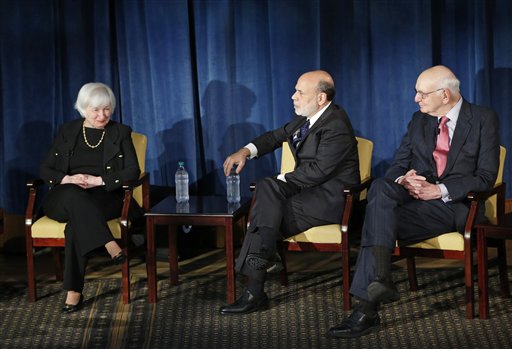Former Federal Reserve chair Alan Greenspan said that monetary policy is largely economic forecasting and that the ability to forecast reliably is significantly limited, in remarks at an International House of New York event on Thursday.
"The real problem is that monetary policy is very largely economic forecasting and our ability to forecast is significantly limited," said Greenspan, who was appointed chair of the Federal Reserve by former president Ronald Reagan and held the position from 1987 to 2006.
The event brought together all four living past and present chairs of the Federal Reserve including the current chair Janet Yellen, and former chairs Ben Bernanke, Alan Greenspan, and Paul Volcker.
"We have to keep the context of what we say in the context of what we know and this is a very serious problem that’s always existed," Greenspan said. "So how do you convey what you know and what is clear without going into the area of forecasting beyond our knowledge?"
Greenspan was asked whether he thought that governments should spend more money in order to combat another possible recession in the future.
"No, in fact I think the major problem that exists is essentially the issue that productivity growth over, pretty much, across the spectrum of all economies has been under 1 percent per year for the last five years," Greenspan said.
"Unless we come to grips with the issue of productivity, then we have no major advance in the future," he said. "I certainly agree that monetary policy should not have the whole load of getting us out of this phenomenon, it’s fundamentally a fiscal problem."
"Spending money only increases the debt," Greenspan said. "I think that the data very importantly show that what we’re facing with the demographics that we have in this country is a major expansion of debt under existing policy. I think unless and until we address that issue we’re going to have problems that are not going to get resolved."
Former chair Ben Bernanke was asked what the Fed could do if and when there was another recession, since their traditional approach of cutting interest rates would not apply given the current historic low rates. Since December 2008, the federal funds rate has been near zero, and the Fed raised this rate to a quarter of a percentage point in December of 2015, seven years later.
While Bernanke cited communication, guidance, and quantitative easing as other tools that the Fed has, he said that it is a mistake to put the entire burden on central banks and monetary policy.
"The Fed in particular is not out of ammunition," Bernanke said. "With that being said I also think that we have learned that it’s a mistake to put all of the burden on the central banks and monetary policy."
"A more balanced policy with a greater fiscal component for example, or for a broader set of policies would no doubt work, even in a situation where central banks were pushed to the limit," he said. "I do think it’s unfortunate that not just the United States but around the world, central banks have carried so much of the burden and we’ve gotten the wrong impression that only central banks can respond to downturns."
Bernanke was also asked about quantitative easing, a policy which increased the Federal Reserve’s balance sheet to roughly $4.5 trillion from 2009 to 2014. The former Fed chair was asked how the bank would unwind that enormous portfolio.
"Well fortunately, I don’t have to do it," Bernanke replied.
"In terms of the unwinding, it actually is a very straightforward process at this point," he said. "The Fed’s statement makes this very clear, at some point the Fed will simply stop reinvesting securities as they mature, will simply step back and say from now on we are going to let things roll off and mature and over a period of a number of years, it will just go down."
"On the whole it has been a pretty successful policy and is one where the roll off has already been planned out and I don’t think it’s going to be terribly problematic," Bernanke said.
